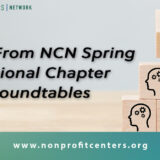What’s in a name?
We are excited that today’s blog author will be featured as one of 8 presentations at this year’s Sharing Innovation 2018. Like what you read? Register today at www.nonprofitcenters.org/sharing
The power of language in how we think about and promote shared resource solutions.
In today’s social and political environment we bear witness every day to how the power of words can divide, discriminate, and denigrate. They can also be tools for equity, justice, and social good. In the field of nonprofit shared resources we need to examine more carefully how our choice of language can aid our cause to foster greater efficiency, equity, and positive social impact. We may find that we are wielding blunt semantic instruments to build our missions.
Let’s look at perhaps our most commonplace expression, “shared resources” (space, people, services, etc.). Our field is growing with increasing demands placed on the third sector as government-provisioned social safety nets wane. The call is ever louder for greater efficiency and equity of access through sharing. However, I’ve been asked frequently how our coworking space at CultureWorks Greater Philadelphia differs from old-school executive suites, or even a generic multi-tenant building. Likewise, as a Model A Fiscal Sponsor, people wonder how our services differ from that of an outsourced bookkeeper, for example. Good questions. If you think about it all professional service firms, for-profit or nonprofit, are “shared resources”; a law firm’s attorneys are “shared” by many clients. And I doubt that NCN would consider itself the association for general multi-tenant landlords, even if they are nonprofit.
So what are we talking about when we say “shared spaces and services”?
I think the difference lies in two critical qualifiers: intentionality and social purpose. We are in the field of intentional, social-purpose resource sharing—a bit of a mouthful, and perhaps there’s a shorter variant, but you get the idea. While outsourcing bookkeeping is a perfectly fine way to “share” a resource, I think we at CultureWorks would think of our resources as being shared by projects and organizations of like mission who are aligned with a set of common values and approach to resource sharing. Indeed, they even share the policies and systems behind bookkeeping, not just the service. Sharing is more about an intentional community of sharers than just someone looking for a cheaper, better, or fractional service. Likewise, coworking—its original, non-commercial form—is about community-generated space and a sense of membership that gathers around a common approach to work, not just a cheaper, more flexible place to park your laptop.
As we work to advocate for the virtues of intentional, social-purpose resource sharing, we face many challenges largely stemming from the strong valorization of independence that permeates American culture and values. These values have largely been forged by free-market capitalism and its focus on private (independent) wealth creation. In contrast, the charitable sector is entirely constituted of public trust assets—assets for social good that belong to the people of state in which the nonprofit is formed, hence the tax-exempt nature of these assets. This status also makes these assets—whether money, real estate, material culture, or other—common pool resources, a kind of public commons.
Common Pool Resource economics, which was pioneered by Nobel-winning political economist Elinor Ostrom, is the study of how we manage and share essential resources that are hard to bound or quantify, such as water, oil, natural lands, and such. While these are traditional commons, I would argue that the concept translates easily to all of the assets of the nonprofit sector. If we accept this analogue, both the political science and language of commons may provide a more effective and compelling framework for speaking about resource sharing, one that is imbued with greater clarity and telegraphs a set of values coherent with the social purpose nature of our work.
I would assert that the force of free-market capitalization and privatization in America has infected the nonprofit, public trust sector in ways that have led us to talk about social good and indeed treat our commons assets as though they are private. This leads to resistance to resource sharing and the mis-directed imposition of certain notions of independence that are incoherent with the very core purpose of the field. How many nonprofit board members understand that they serve as a proxy to the Attorney General of the state in which they operate, who in turn represents the interests of the people with regard to these commons assets? Instead, we often find boards (and indeed executives and founders) treating the assets of their organizations as though they were “private”.
If you apply a commons lens to the work of the social good sector, the value of independent organizations and formations starts to dissolve. To be sure we need a diversity and proliferation of missions and purposes, which can be distinct and “independent”. But these missions do not require independently formed and provisioned resources to support them; there is much they can share without compromising the independence of their vision. Independence of mission and vision does not necessitate independence of infrastructure.
We have found in our work at CultureWorks that framing our resources as commons provides a more clear and compelling framework for both talking about our work with potential members and designing policies and structures for developing what we now call our management commons. Our members are drawn to the set of values and stakeholdership that commons connotes, moreso than to the comparatively transactional notion of simply sharing a resource.
In closing, I offer the below comparison between the language of what we might call the capitalist economy and that of the commons economy. And I invite you to consider how this shift in language might be applied to your own organization’s work and, more critically, how it might motivate a very different view (internal and external) of both how and why public trust commons are so critical to the future of a just, equitable, and flourishing society.
Transactional/Capitalist Economy Sharing/Commons Economy
(Private Asset Building) (Common Pool Resource Building)
Sale ……………… Contribution
Fee ……………… Allocation
Asset (service, money, space, etc.) ……………… Resource
Gain (of any asset) to a Member from outside ……………… Additive Resource Allocation
Loss (of any asset) to a Member from outside ……………… Subtractive Resource Allocation
Loss or Gain to/from a member within ……………… Internal Asset Re-allocation
Client ……………… Stakeholder/Contributor
Partner ……………… Member
Competition ……………… Collaboration
Competitor ……………… Collaborator/Complementor
Institutional Capacity Building ……………… Community/Resource Building
Organizational Sustainability ……………… Individual/Collective Flourishing
Excellence ……………… Intentionality
Quality ……………… Impact/Benefit
Non-profit ……………… Social/Common Purpose/Benefit
For-profit ……………… Private Purpose/Benefit
Scarcity ……………… Plenty







